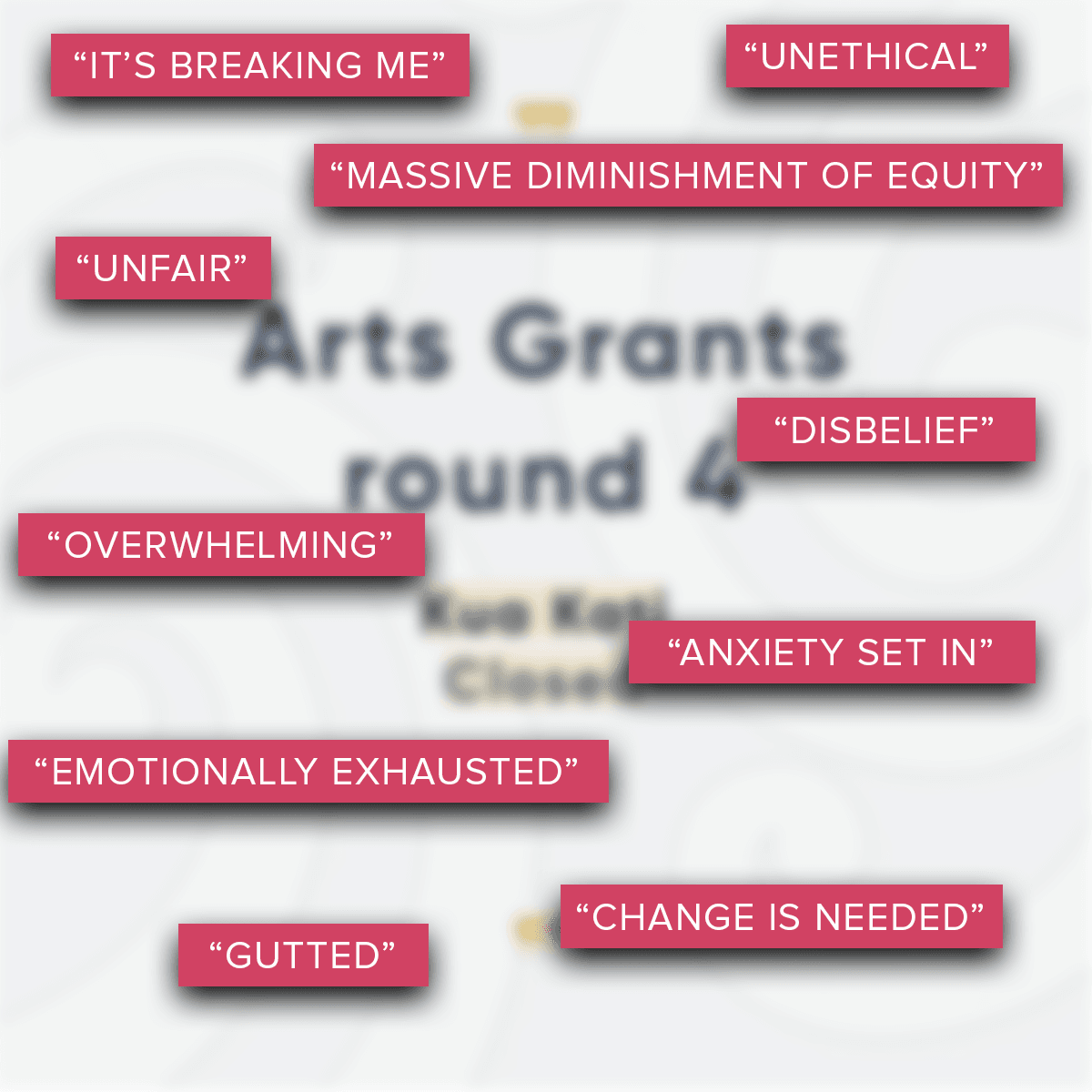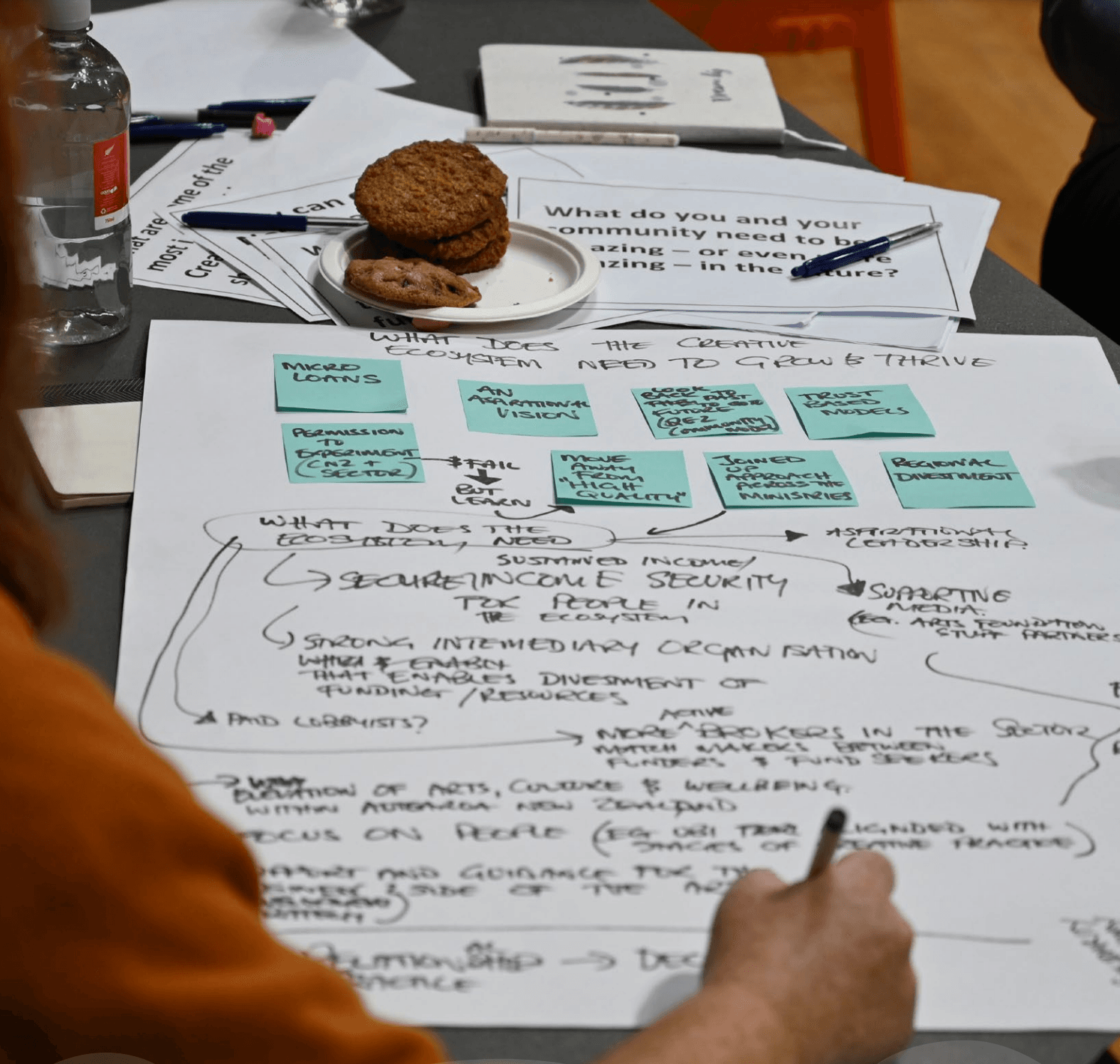Reaction To Arts Grants Headaches - CNZ Responds
Creative NZ's last ever 'capped' Arts Grants round proved a nightmare for many - and a experience for others. We have the full gambit of experiences from the 24 hour window complicated by technical issues.
Written by

Creatives will never again have to deal with the brutal nature of the 'cap' system when applying for Creative New Zealand (CNZ) funding.
But there is still rage about why they had to in the first place - and those who went through it want answers to why the process was made even more stressful by a system that wasn't able to keep up with demand.
Despite raising the cut-off for last week's Arts Grants round from 250 applications to 450 - CNZ was still overwhelmed with the avalanche of applications that saw the funding window slammed shut after barely 24 hours.
To put it in context - that was the same amount of time the February Arts Grant round was open for, but with an extra 200 applications this time around.
The Big Idea has received a number of responses from creatives and arts organisations left shellshocked by the latest experience.
Much of the devastation - from those who got their applications in and from those who didn't - stemmed from the CNZ portal straining under the pressure of having so many applicants jumping on at once. This is, of course, a direct consequence of the cap and why there are constant comparisions to The Hunger Games.
If you're not quick off the draw, you are left for dead.
Creative reaction
There are many reports of applicants getting stuck, unable to save their mahi, of freezes and glitches and of losing their application altogether and needing to start again. Some needed to spend hours in front of their screen, desperately trying to get across the finish line in the race to 450.
Many who contacted The Big Idea wished to give their stories anonymously - because of the fear (unfounded or otherwise) that speaking their mind could hinder their funding aspirations.
One of them previously missed out during the submission stampede for the February window and decided to have another crack last Thursday.
"I was online and ready to go well before 9am. I was incredibly organised - having spent hundreds of hours writing, editing, counting characters, requesting support material and quotes. So I started out feeling quite confident. I was not going to miss out this time!
"After trying to 'save' my progress unsuccessfully a couple of times I began to get anxious.
'An error has occurred' flashed up in bright orange and I began to shake.
"There was no response. I sat staring at the screen in disbelief. Surely this wasn't happening right now.
"I had no choice but to start again. Thankfully I went right through the process without any more problems. Once submitted, the relief seeped slowly through my body.
"This is not an experience I wish to repeat."

A vastly experienced funding applicant and established arts leader spoke of their frustration.
'I followed the instructions and wrote the text (prior to the funding portal opening) to cut and paste in. I started as soon as the portal opened and managed to save once - before it was impossible and I was watching the orange dialogue box that said 'try in 30 seconds' - permanently.
"I exited - losing all entered data - and started again but this time couldn’t save anything.
"So I rang the Funding Advisor who had answered my one question. Their mobile number went to something that sounded like a fax line. No reply on her direct dial landline either. I rang the main number and chose to speak to the portal team - no answer - left messages where I could.
"Anxiety set in. This application was the result of at least 6 months research, meetings, letter gathering. Was I the one who was going to let the team down by not getting it in?
"Then I did get a return call. She was calm and helpful. The logjam in the system was being sorted. If I Refreshed and started again it would probably be fine. I was. It just meant I’d likely lose all my entered data, I did, some for the third time.
"I got my data in - validated and submitted - about 2 hours after starting most of which time I was staring at a non-functional system, getting angry, losing data and feeling like an idiot.
It’s not acceptable for any public process to humiliate participants, even if inadvertently.
"It seems a massive diminishment of equity. I had the time to hang in the process even though I wasn’t on a payroll. Applicants who were professional paid staff had the time to hang in the process.
"But what say you were applying for a community group and only had time when the system collapsed to complete your application because you were going away, into hospital or just to work. There were no guarantees when the portal would close so the pressure was on.
"By the time I finished I felt sort of emotionally exhausted - although all I’d done was some cutting and pasting. Just getting it submitted seems like a thrill as big as getting a 'Yes' letter which I think I deserve."
Well-regarded poet, artist and creative leader Courtney Sina Meredith took to social media to call out a process she described as "shocking to see and unethical/unfair to working people and those working for others who can't drop everything to be in the portal all day - plus the privilege of access to reliable internet and so forth in the first place."
That was reiterated by artist Anna Evans, who posted "zero chance for rural artists not hooked up to satellite or ultra-fast broadband."
One award-winning winning author told The Big Idea of their frustration that individuals have to compete with companies, something they point out would be in separate streams for funding applications in other countries.
"I haven’t even attempted further Arts Funding Round applications with Creative NZ after being unsuccessful many times and seeing that individual writers must compete with publishers and academics. It doesn’t feel like the same players are on the field. We never know which big players we are up against."
First time feedback
In the story we published last week - The Big Idea spoke to several first-time applicants to see how they prepared for what lay ahead - so we checked back in to see their take on the experience.
The answer - stressful but a helpful learning opportunity.
Documentary and portrait photographer Sara (Hera) Tautuku Orme explains "Initially, I was apprehensive about the CNZ portal and the 9:00am start time. Although I spent sometime familiarising myself with the application, the time factor still added to my anxiety levels.
"I couldn't help but imagine 450+ applicants racing to complete their applications simultaneously. The thought of losing a week's worth of late nights and early mornings because I was the 451st applicant was nerve-wracking. To make matters worse, the portal crashed and the downtime felt like an eternity.
"However, I did it! The feeling afterwards was pure elation, like the relief of finishing a daunting exam. Although the outcome is uncertain, I know that I have developed a well-defined and well-considered approach to my kaupapa.
The learning process has been immense.
"This kaupapa is something I have been contemplating for some time, and the pressure of a tight timeframe and hyper-focus was exactly what I needed.
"Overall, the application process was intense, but the CNZ staff were very supportive and helpful throughout the morning."
Abstract artist Kirsty Black's experience was similar.
"I was all set to go at 9am - apparently so were lots of others, as I had trouble saving. I also managed to lose all my info and had to restart from scratch 3 times, once when I clicked the validate button, the other 2 when I tried to save. I’m not sure what the purpose of Validate is. In the end I submitted without validating.
"Stupidly, I hadn’t realised that there were different sections - Idea, Process, People, Budget. As I didn’t want to miss the cut-off at 450-cap, I ended up writing the Process and People off the cuff, however I had included the relevant info in the idea section so was able to rework for the other areas. I possibly didn’t include enough info about myself. I will definitely ask for feedback on my application.
"The whole process ended up taking an hour, due mostly to having to re-input my info. I didn’t receive an email upon successfully submitting, which I found disconcerting.
"While I’m hopeful that I will receive funding, I’m viewing the process as a learning experience. Even without funding, it was a valuable exercise to properly understand the cost involved for my project. In the past I would have gone ahead and winged it without really understanding the actual costs – so that is a win in itself."
Pressure on the process

Change is happening - this we know.
The cap has thankfully been scrapped - with future Arts Grants rounds open for a month and no maximum number of applications, which will likely end the portal and technical process being overwhelmed as they were last week.
But it can't - and won't - end there.
An application veteran muses of what people experienced on Thursday/Friday "In the past, I’ve sort of enjoyed the application process - maybe it's more accurate to say found the process useful, in that the questions sharpen you and help clarify aspects of a project.
"But this process didn’t. It felt that like there was no time or opportunity for the usual process of reviewing and editing to make sure all points were covered. Any process that works against reviewing and editing to make sure I was putting my best foot forward is surely not a good process."
Basement Theatre's Cat Ruka was another looking for solutions.
She proactively posted on CNZ's round closure Instagram post "This experience provides stark evidence for sector leaders to use in their advocacy to government. Sector leaders need to collaborate with funders to get the message across that more pūtea for our sector is grossly needed.
"Let’s mahi tahi to make the change that is needed."
On the same day that the funding round closed, CNZ also released a report on the Future of Arts Development workshops they ran across the country and online - a report that starts with the sentence "The current state of arts development and arts funding in Aotearoa New Zealand isn’t working for everyone."
Gretchen La Roche, CNZ's Arts Development Services Senior Manager, described the feedback experience as both "inspiring and humbling" addressed the findings in an email to many who took part in the workshops.
"We heard both your frustrations with the current system and your hopes for the future.
"We need to do things differently. Artists, arts organisations and communities across the country need to be at the heart of these changes."
The five main points CNZ is highlighting out of the workshop feedback are:
Connection: Build better long-term relationships with artists and arts organisations based on trust and respect.
Accessibility: Make our processes and the way we work together easier.
Autonomy: Give people a greater decision-making role about arts development in their community.
Leadership: Make connections between artists, arts organisations, local governments and businesses to support each other better.
Advocacy: Use our voice more so the lives of artists and the value of the arts are better respected and understood.
La Roche continues "We want to make these changes too, and we want to work with artists to make them. Some of these things will take longer to change, but we can start now."
Creative NZ Responds
The Big Idea reached out to CNZ with for their response to this Arts Grants round.
When asked if they expected the 450 applicant cap to be reached at the stage it did or if it caught them by surprise, David Pannett, CNZ's Senior Manager Strategy & Engagement responds "We had done some thorough analysis of recent rounds’ closing times and were prepared for this round to also meet the cap quickly.
"Our teams are very experienced with the arts grants process, so we were prepped and ready to answer questions from applicants; it’s always a busy time."
On the technical issues that plagued this round, Pannett noted that there had been portal issues in the past "but not of this scale with so many people impacted in a short period of time."
He expands "We knew it would be a busy day with a lot of users on the portal; we’d planned for heavy traffic, with our small systems team standing by to support applicants and keep the system running – they were on the phone with applicants and responding to emails throughout the day.
"We did have a large number of users concentrated at one time; this caused the system to slow, which in turn led to many applicants opening multiple windows and refreshing frequently – which added further to the pressure on the system."
Feedback from frustrated applicants that the promise of being kept up to date with how many drafts were in play wasn't available. We put this to Pannett.
"When the technical issues occurred, many people created multiple draft applications and this number was much higher than the actual number of people still working on applications; in order not to cause confusion we made a call not to update the draft applications and to instead list at the top of the site regular updates on the number of completed and submitted applications for accuracy."
When asked whether - in retrospect - the ‘cap’ should have been removed entirely for this round, Pannett answered.
"We’ve been clear that from the next round, there won’t be a cap. We increased this round’s cap from 250 to 450 – it’s the fastest way to get where we’re going – but our resources are restricted, and we topped this round up so we’d be able to raise the cap and fund more great projects.
"This was the most we could do with our current resources."